Air France-KLM's board meets on Tuesday morning to appoint an interim chief executive for the Franco-Dutch airline, who will have to tackle French unions emboldened after the departure of previous boss Jean-Marc Janaillac.
Janaillac, who announced his resignation on May 4 after French staff voted against a pay proposal, has been asked to remain on until after the end of Tuesday's annual shareholder meeting, which starts at 1230 GMT.
Among contenders in the frame for the interim CEO role is Anne-Marie Idrac, 66, an independent director on the Air France-KLM governing board who joined the group in November 2017.
Idrac was previously head of the RATP Paris public transport authority and the SNCF state railway operator, and was also previously secretary of state for transport.
The French government, Air France-KLM's largest shareholder with a 14 percent stake, has said it would like someone with experience of the aviation industry.
Other names cited by French media include Fabrice Bregier, former head of the planemaking arm of aerospace and defence group Airbus, Franck Terner, currently CEO of the Air France business and Gilles Gateau, head of HR at Air France.
The new boss will be appointed on an interim basis but it is not clear how long that means.
The unions have suspended their strike action while Air France-KLM replaces Janaillac. So far, 15 days of walkouts this year have cost Air France-KLM around 400 million euros, while rising oil prices are adding to the pressure on the company.
Although the unions have said they feel vindicated in their strike action by Janaillac's resignation, the signals are that change is coming for Air France.
French President Emmanuel Macron is trying to push through labour reforms, also prompting strikes on the railways. Air France-KLM also has two relatively new shareholders in Delta Air Lines and China Eastern , which each hold a 9 percent stake.
‘Given the changes to both board and politics, we expect the new CEO to be appointed with a mandate to restructure rather than appease,’ HSBC analyst Andrew Lobbenberg said in a note.

